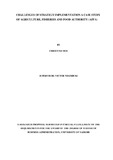| dc.description.abstract | The following research was undertaken to study the challenges to implementation of strategies
at Agriculture, Fisheries and Food Authority the regulatory body with the mandate and
responsibility to oversee the Regulation, Development and Promotion of scheduled crops.
The objectives of the research were to identify the challenges faced by AFFA in strategy
implementation in relation to, procedures and policies adopted by the Authority, to determine
whether Resource allocation affect strategy implementation, determine whether Managerial
Behaviour is a determinant of effective strategy implementation and lastly examine whether
Rewards and Incentives influence strategy implementation at Agriculture, Fisheries and Food
Authority.
The research design was descriptive case study carried out at Agriculture, Fisheries and Food
Authority headquarters, and the Directorates. Primary qualitative data was used for the study
specifically by use of interview guide. This instrument was considered appropriate for this study
because all the respondents were well informed top management team of AFFA. The population
for the proposed study was the institutions’ Heads Directorates, Senior Managers with special
reference to Manager in charge of Strategic Planning. The researcher analyzed the presence,
meanings and relationships on the concept of strategy implementation which were
summarized in comparison with the theories captured in the literature review. Content
analysis was used for data analysis since it involved discussion.
The study revealed that Managerial Behaviour, Resource Allocation and Rewards and
Incentives have a strong effect on strategy implementation unlike Institutional Policies. In
general, the study has shown that Strategy implementation focuses on a wider array of factors
that influence its implementation both internally and externally as well as behavioral and
systematic factors. Some other internal factors include organization structure. The Authority
must be willing and ready to modify its strategy in response to changing market conditions,
advancing technology, the fresh needs of stakeholders, shifting consumer needs and
preferences, emerging market opportunities, new ideas for improving the strategy and
mounting evidence that the strategy is not working well. | en_US |

